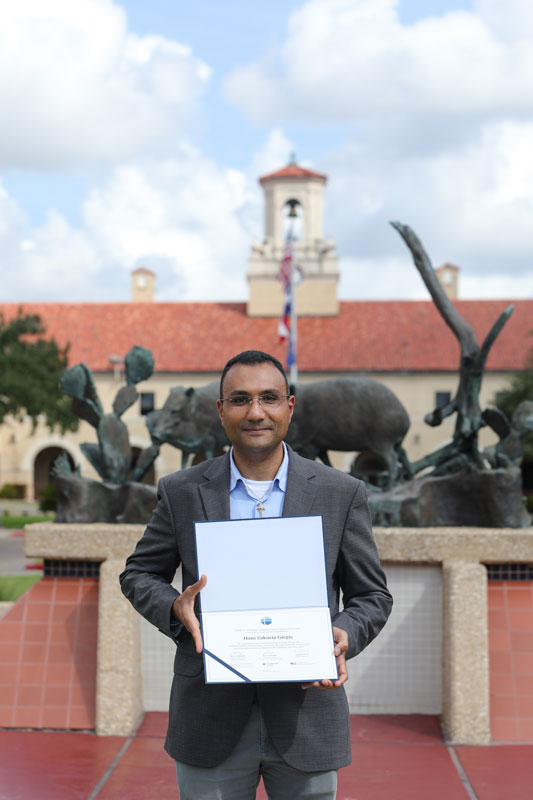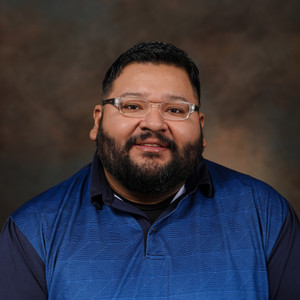KINGSVILLE (Nov. 7, 2025) — After being selected as a 2024-25 Fulbright U.S. Scholar, and spending more than 11 months teaching and conducting research at the Adam Mickiewicz University (AMU) in Poznan, Poland, Texas A&M University-Kingsville (TAMUK) Associate Professor of Computer Science Dr. Hani Girgis returned to the TAMUK classroom this semester, reflecting on a positive Fulbright experience.
Girgis was hosted by the Computational Biology Department of the Institute of Molecular Biology and Biotechnology of Adam Mickiewicz University where he split his time not only teaching and researching but making real connections with fellow researchers and prominent officials.
“The award is meant to be away to establish friendships between American people and other countries and my experience was specific to Poland,” Girgis said. “There was also a very strong research and teaching component. I would spend about 80 percent of my time researching and about 20 percent teaching. There were multiple events where I had the opportunity to meet diplomats and high officers in Poland including Polish Deputy Minister of Science and Higher Education Andrzej Szeptycki and Deputy Chief of Mission and Charge’ d’Affaires ad interim at the U.S. Embassy in Warsaw Daniel J. Lawton (currently serves as Deputy Assistant Secretary for Western Central Europe and Southern Europe in the Bureau of European and Eurasian Affairs).”
"The staff of the Polish-U.S. Fulbright Commission are very diligent and caring," Girgis added. "They did a wonderful job following up on the entire U.S. cohort and making Poland a true home for us."
Girgis was featured in expert-lecture series as a part of their bachelor and master’s studies in bioinformatics and taught a course focusing on artificial intelligence (A.I) research areas specific to biology, medicine and computer science and applies A.I. to help scientist understand functions of human DNA.
Through interactions with the students, Girgis admired the way classes and lectures were scheduled. Poland uses a block system where the professor schedules out the lecture hours in advance, leaving students an opportunity to carve out a course that’s right for them.
“There was a different structure to teaching courses in that they are more flexible,” Girgis said. “I personally enjoyed it because it was so efficient. We finished our entire course in 10 meetings. The students have a representative, and they will come and negotiate with you on the structure of the course.”
When it came to research outside of class, Girgis was asked to help with a project related to leukemia.
While Girgis never specialized or applied focus towards cancer in any of his research, the disease is present in his personal life in multiple ways as it impacted a close friend of his and was the subject of panel discussions he was asked to participate in by the National Institutes of Health.
After serving on one of those panels, it was then that Girgis was accepted into the Fulbright program and was asked to help on the leukemia project — a sign of sorts that he refused to ignore.
“I told my host that I didn’t believe in coincidences and that I should be doing something for cancer,” Girgis said. “I went to Poland, I focused on what was in the original proposal, which was to applying techniques from natural language processing and computer vision to analyze DNA sequences. In addition to that, we developed a method that would help us, whenever we are successful, generate enzymes and proteins that can cure leukemia, as well as many other diseases.”
While Girgis’ academic experiences meant a great deal to him, he mentioned his experiences with the Polish people, lauding them for their kindness while recanting stories of strangers helping him get his two dogs around on public trains and the warmness of his new colleagues in fulfilling conversations and simple gestures.
“You can see the kindness from people you don’t know and one of them became my friend,” Girgis said. “People just helped for nothing; they helped just for helping. The collegial relationships I made there were really amazing and that will contribute to the success of anything. This experience succeeded because of my host and colleagues. It was just good to get together around a big donut or coffee. It was very warm and intellectually stimulating.”
Girgis does not want his experience to be one that he alone gets to enjoy and look back on and encourages other faculty and especially students to pursue Fulbright paths whether it be overseas or within the United States, citing separate paths for scholars and scientists and young professionals and artists.
“American students can pursue degrees overseas and it will be fully funded,” Girgis said. “They can get their master's and doctorates overseas and they will represent America and TAMUK overseas. They can be like tiny ambassadors to the rest of the world. Our young students can go overseas and go to work. It’s just prestigious and very competitive, and students can take this award and visit some of the best universities worldwide.
“That will allow them to make a great contribution to America,” Girgis added. “For faculty, there are also opportunities to invite colleagues from overseas. It’s a great opportunity to exchange cultures, to expand our horizons and to let people know about American values while we learn about world values.”
-TAMUK-

